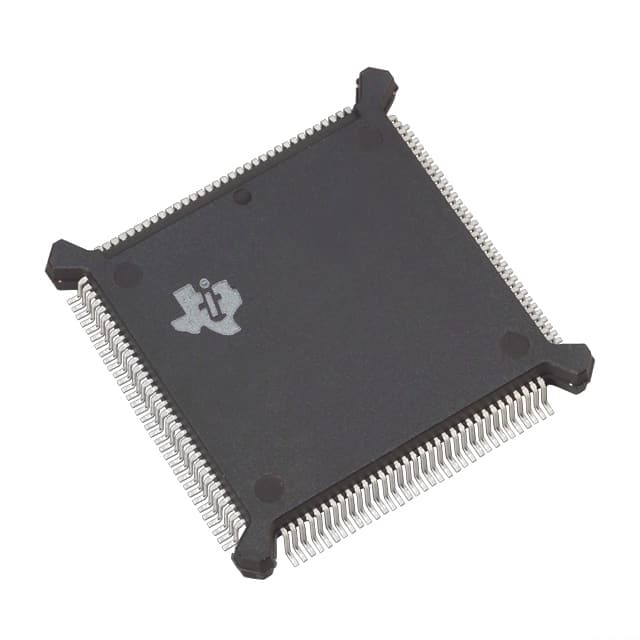TMS320LC50PQA
Product Overview
Category
The TMS320LC50PQA belongs to the category of digital signal processors (DSPs).
Use
It is primarily used for processing and manipulating digital signals in various applications such as telecommunications, audio and video processing, image recognition, and control systems.
Characteristics
- High-speed processing capabilities
- Efficient execution of complex algorithms
- Low power consumption
- Integrated peripherals for enhanced functionality
- Flexible programming options
Package
The TMS320LC50PQA is available in a compact and durable package, ensuring easy integration into electronic devices.
Essence
The essence of the TMS320LC50PQA lies in its ability to perform high-speed digital signal processing tasks with low power consumption, making it suitable for a wide range of applications.
Packaging/Quantity
The TMS320LC50PQA is typically packaged in a small outline integrated circuit (SOIC) package. It is commonly available in reels or trays containing multiple units.
Specifications
- Architecture: Harvard architecture
- Clock Speed: Up to 50 MHz
- Data Bus Width: 16-bit
- Instruction Set: Modified Harvard architecture instruction set
- Memory: On-chip RAM and ROM
- I/O Ports: Multiple general-purpose I/O pins
- Power Supply: 3.3V
Detailed Pin Configuration
The TMS320LC50PQA has a total of 64 pins, which are assigned to various functions such as data input/output, address bus, control signals, and power supply.
(Pin configuration diagram can be included here)
Functional Features
- High-performance arithmetic logic unit (ALU)
- Efficient multiplier and accumulator (MAC) unit
- Integrated direct memory access (DMA) controller
- Serial communication interface (SCI) for data transfer
- Interrupt controller for managing system events
- Timer/counter modules for precise timing operations
Advantages and Disadvantages
Advantages
- High-speed processing capabilities enable real-time signal processing applications.
- Low power consumption makes it suitable for portable and battery-powered devices.
- Integrated peripherals reduce the need for external components, simplifying system design.
- Flexible programming options allow customization for specific application requirements.
Disadvantages
- Limited memory capacity compared to some other DSPs in the market.
- May require additional external components for certain advanced functionalities.
- Higher cost compared to general-purpose microcontrollers.
Working Principles
The TMS320LC50PQA operates based on the principles of digital signal processing. It receives digital signals from external sources, performs mathematical operations on them using its ALU and MAC unit, and produces processed output signals. The processor's architecture and instruction set are optimized for efficient execution of complex algorithms commonly encountered in signal processing applications.
Detailed Application Field Plans
The TMS320LC50PQA finds extensive use in various application fields, including:
- Telecommunications: Signal processing in telecommunication systems, such as voice and data compression, echo cancellation, and channel equalization.
- Audio and Video Processing: Real-time audio and video processing tasks, including noise reduction, filtering, and image enhancement.
- Image Recognition: Processing and analysis of images for pattern recognition, object detection, and computer vision applications.
- Control Systems: Implementation of control algorithms in industrial automation, robotics, and automotive systems.
Detailed and Complete Alternative Models
- TMS320C6713: A more advanced DSP with higher clock speed and increased memory capacity.
- ADSP-BF706: A DSP from Analog Devices offering enhanced floating-point processing capabilities.
- STM32F407: A microcontroller from STMicroelectronics that combines DSP functionality with general-purpose computing capabilities.
These alternative models provide similar or improved features compared to the TMS320LC50PQA, catering to different application requirements.
In conclusion, the TMS320LC50PQA is a versatile digital signal processor with high-speed processing capabilities and low power consumption. Its integration of peripherals and flexible programming options make it suitable for a wide range of applications in telecommunications, audio and video processing, image recognition, and control systems. While it has certain limitations, alternative models offer more advanced features for specific needs.
רשום 10 שאלות ותשובות נפוצות הקשורות ליישום של TMS320LC50PQA בפתרונות טכניים
Sure! Here are 10 common questions and answers related to the application of TMS320LC50PQA in technical solutions:
Q: What is TMS320LC50PQA? A: TMS320LC50PQA is a digital signal processor (DSP) chip manufactured by Texas Instruments.
Q: What are the key features of TMS320LC50PQA? A: Some key features of TMS320LC50PQA include a 16-bit fixed-point DSP core, on-chip memory, multiple I/O interfaces, and low power consumption.
Q: What are the typical applications of TMS320LC50PQA? A: TMS320LC50PQA is commonly used in applications such as audio processing, telecommunications, motor control, industrial automation, and medical devices.
Q: How does TMS320LC50PQA handle real-time processing tasks? A: TMS320LC50PQA is designed for real-time processing with its high-speed DSP core and efficient instruction set architecture.
Q: Can TMS320LC50PQA be programmed using C or assembly language? A: Yes, TMS320LC50PQA can be programmed using both C and assembly language, providing flexibility to developers.
Q: What is the maximum clock frequency supported by TMS320LC50PQA? A: TMS320LC50PQA supports a maximum clock frequency of 40 MHz.
Q: Does TMS320LC50PQA have any built-in peripherals? A: Yes, TMS320LC50PQA has built-in peripherals such as timers, serial ports, parallel ports, and interrupt controllers.
Q: Can TMS320LC50PQA interface with external memory devices? A: Yes, TMS320LC50PQA supports external memory interfaces, allowing for expanded storage capacity.
Q: What is the power consumption of TMS320LC50PQA? A: The power consumption of TMS320LC50PQA depends on the operating frequency and the specific application, but it is generally low compared to other DSP chips.
Q: Are there any development tools available for programming TMS320LC50PQA? A: Yes, Texas Instruments provides a range of development tools, including compilers, debuggers, and emulators, specifically designed for programming TMS320LC50PQA.
Please note that these answers are general and may vary depending on the specific requirements and implementation of TMS320LC50PQA in different technical solutions.


